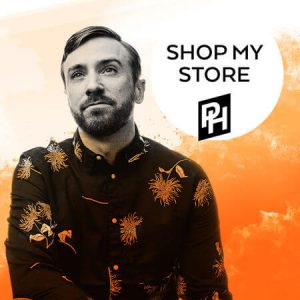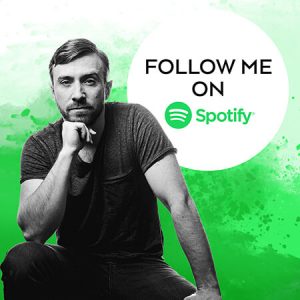1) How has independent music distribution become easier, and why does this benefit listeners/consumers?
Independent music distribution has become much easier as artist-created platforms have risen up to fulfill the traditional services provided by record labels. For example, I do all my direct distribution through a platform called Loudr. Rather than being a music store, Loudr allows my fans to pay what they want to support my music and in return get lossless-quality audio — meaning the exact sound I have in my studio while I finish my mastered version, and not the crappy .mp3 version given by most sites.
One of the other effects of direct artist-to-fan platforms is the lower overhead. It’s pretty well known that iTunes takes a big chunk of each sale. I can actually offer my music for less on Loudr ($1 vs $1.29 on iTunes) and STILL end up making more money from each sale. It integrates beautifully with YouTube videos, and I can bundle different albums and singles together right on an album page, which helps my fans find my music and encourages them to get multiple albums at once. It’s also cool that my fans know that they’re supporting me and my music directly — I’ve been shocked by how generous they are, and it literally keeps me going!
2) Why did you go independent versus trying to get on a label?
There are very little reasons for artists to sign an old school record deal. There are many different kinds of deals, from licensing deals to distribution deals… just make sure you never give up your creative rights and decision making to anyone. Ever…… I believe strongly that YouTube’s success as a media site is leveling the entire playing field. Any artist with the drive, talent and the know-how to create their own content can make a living doing what they love, which means more music, more art, more inspiration, and more people on this Earth doing what they were meant to do: create and inspire!
Here is my workflow, and it is something I would recommend EVERY artist replicate: Create content that is genuine to who you are as an artist, basically what you LOVE to do, what you are best at. Then utilize your social circle or social media influence and fund the creation of your content with a crowdfunding platform. For example, Patreon is an INCREDIBLE platform made by an artist for artists (created by Jack Conte of Pomplamoose). Currently I’ve made two pushes and already have over 380 supporters that help give me a consistent, guaranteed base amount for every video I publish.
Next, use Loudr as your main distribution platform. They will license all of your songs for you if you are doing covers, make sure you are 100 percent legal, and send you a check every month, saving you time from having to report sales and doing the licensing of your songs, which allows you to get back into the studio and create more good content!
3) What online platforms can consumers use to find/buy your music and music of other independent artists? List the ones you use and other ones that are available. And why do you use the ones that you do?
In order of what I recommend:
#1 – Loudr (Lossless format, pay what you want, highest % to artist)
#2 – iTunes (integration with ecosystem)
#3 – Google Play, Amazon
#4 – Physical album available on your website
#5 – Streaming options: Spotify, Rdio, Pandora, Deezer, iTunes/Beats
I currently use every distribution platform I can find, as I want my music to be as accessible as possible to everyone all over the world. Loudr is the platform I most strongly recommend for my supporters, and it’s where I tell my mom to purchase my music.
4) What is the future of music distribution? Fewer people on labels? More independent distribution? More platforms for online distribution? And what does this mean for consumers?
I believe the future is here. Using YouTube as the distribution platform for the music video and single, selling it on Loudr, and supporting consistent content with Patreon, is basically everything a label can offer you other than radio play. We all saw what Macklemore & Ryan Lewis just did with their last album. We the people are taking back the power from “the man.” Artists are creating sites like Loudr and Patreon, and we can create our content, distribute and support ourselves. No longer do we need a label or some old rich man in a suit to tell us that our music is good. Listen to me: don’t sign, push ahead, create your own work that speaks to you, and go it alone. It’s the future, it’s here, and we can do it together.
In the end, if you are an independent musician, you should do WHATEVER you can to prevent people’s hands from reaching in your pocket. Pay your production teams by the hour and keep 100 percent of the backend. Use crowdfunding to help pay your production costs, and push your audience to the places on the internet that give you back the most money and support as an INDEPENDENT musician/creator. Currently, that is Loudr and Patreon for me. By the way, these aren’t secrets. This is what is available, and people should be using them. If you are an independent musician or creator and you aren’t using these sites to help make a living, you are missing out. Both sites were created BY musicians for musicians/creators.
In addition I suggest using a new website that I love called Tubular Labs. In my eyes, it’s the only place you should go to learn about how to process and understand any and all analytical data to support your work and your marketing ideas.
While we’re at it, if you aren’t on Twitter, Facebook, YouTube, Google+, and/or Tumblr engaging and answering your supporters, you are doing something wrong — especially if you are using Loudr or Patreon. These people are PAYING you to make content. The least you can do is make sure to talk to as many of them as you can. If you think you won’t have time, people can be a lot more understanding than you think.
Engage. Be genuine. Be who you are, and damn it, do it yourself, and you will have a better chance of succeeding. Don’t allow anyone to take a huge piece of your revenue stream. They didn’t create your brand, they didn’t develop YOUR talent — don’t give them your money. Do it yourself, and you will succeed.



